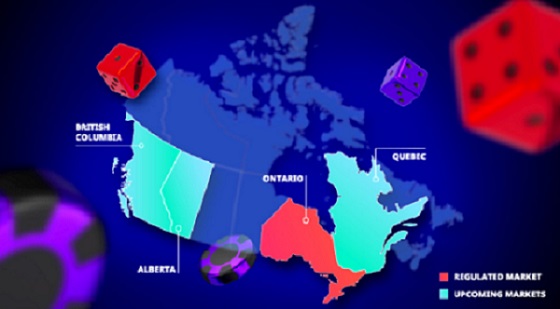Also Interesting
Casino market in Canada grows in 2023 as more states consider legalization of igaming

The year 2023 marked a significant turning point for the Canadian casino industry. Ontario, the country’s most populous province, took a bold step by legalizing and regulating online gambling within its borders. This decision, met with anticipation by both the public and gambling operators, has demonstrably revitalized Ontario’s casino market and sparked discussions about similar moves across Canada.
Prior to 2023, online gambling in Canada existed in a legal grey area. While federal law prohibited the operation of online casinos by domestic entities, Canadians were free to access offshore websites that were offering various virtual slot machines, table games like blackjack or roulette and sports betting. This presented a challenge for regulators. Not only were they unable to capture tax revenue from this activity, but they also lacked control over consumer protection measures and responsible gambling initiatives.
Ontario’s decision to legalize online gambling addressed these concerns head-on. The province established a regulated online gaming market, allowing licensed operators to offer casino games, sports betting, and other forms of online gambling to residents. This move not only provided a safe and secure environment for players but also opened up a new avenue for tax generation.
The impact of Ontario’s online gambling legalization has been undeniable. Since its launch in April 2023, the market has experienced explosive growth. Gross gaming revenue (GGR) from online gambling platforms has surpassed initial projections, with analysts attributing this success to a combination of factors. Firstly, the convenience and accessibility of online gambling have attracted new customers who may not have frequented traditional brick-and-mortar casinos. Secondly, the variety and innovation offered by online platforms – with their extensive game libraries, live dealer experiences, and mobile compatibility – have proven highly appealing to existing gambling enthusiasts.
The economic benefits for Ontario have been substantial. Tax revenue generated from online gambling is already exceeding estimates, providing a significant boost to provincial coffers. These funds are being directed towards various government initiatives, from infrastructure development to social programs. This tangible financial success has not gone unnoticed by other provinces across Canada.
Several provinces, including British Columbia, Alberta, and Manitoba, are actively considering following Ontario’s lead and legalizing online gambling within their own jurisdictions. These provinces are closely monitoring Ontario’s experience, with a keen eye on the regulatory framework, tax revenue generation, and potential social impacts.
Proponents of online gambling legalization argue that the benefits extend beyond just tax revenue. A regulated market allows for stricter controls on advertising, responsible gambling measures, and player protection. Additionally, it fosters competition within the industry, potentially leading to better odds and a wider variety of games for consumers.
Opponents, however, raise concerns about potential increases in problem gambling rates and the social costs associated with it. They argue that the ease of access and anonymity offered by online platforms could exacerbate gambling addiction. Additionally, the potential for increased advertising and marketing associated with a legal online gambling market raises concerns about the normalization of gambling behavior.
Despite these concerns, the success of Ontario’s online gambling legalization has undoubtedly reignited the conversation across Canada. As other provinces weigh the potential benefits and drawbacks, it seems likely that online gambling will become a more prominent feature of the Canadian casino market in the near future. The key will be striking a balance between generating revenue, protecting consumers, and mitigating potential social harms. By learning from Ontario’s experience and implementing a robust regulatory framework, other provinces can pave the way for a safe, responsible, and prosperous online gambling market in Canada.
Also Interesting
Endorphina Slots: High-Quality Games Now at Zoome Casino Canada

If you’re looking for a provider that blends striking visuals, solid math models, and engaging themes, Endorphina slots are a must-try. Now featured at Zoome casino, Endorphina is quickly becoming a favourite among Canadian players who enjoy well-balanced volatility and great return potential.
From classic fruit machines to themed adventures with expanding wilds, Endorphina in casino environments offers reliable entertainment and serious payout opportunities. But what makes these games stand out? Let’s break down the key features, winning potential, and why you should play Endorphina games at Zoome.
Who Is Endorphina?
Endorphina is a leading game provider based in Prague, with over a decade of experience in developing online slots for regulated markets. The company is known for its well-polished video slots that balance engaging storylines with player-friendly mechanics. Their catalogue includes over 100 titles, with new releases launched regularly.
In Canada, Endorphina slots are now widely accessible through Zoome casino, one of the country’s fastest-growing platforms with a large game library and crypto-friendly payments.
Popular Endorphina Slots You Can Try at Zoome
Once you complete your zoome casino login, head over to the Endorphina slots section to discover a curated list of titles. Here are some fan favourites:
1. Hell Hot 100
● RTP (Return to Player): 96.07%
● Volatility: Medium
● Max Win: 1,000x
● Type: Classic fruit slot with a hot twist
● Why Play: Simple gameplay, blazing fast spins, and high hit frequency
2. Chance Machine 100
● RTP: 96.00%
● Volatility: Low to Medium
● Max Win: 5,000x
● Features: Expanding wilds, stacked symbols
● Why Play: Perfect for casual players who want frequent wins
3. Book of Santa
● RTP: 96.00%
● Volatility: High
● Max Win: 5,500x
● Features: Free spins with expanding symbols
● Why Play: A seasonal slot that pays like a timeless classic
4. Tribe
● RTP: 96.00%
● Volatility: Medium to High
● Max Win: 3,000x
● Special Feature: Free spins with progressive multipliers
● Why Play: Visually beautiful with strong payout structure
All endorphina games are built with HTML5, ensuring smooth play on desktop and mobile without requiring downloads.
Are There Endorphina Free Slots?
Yes! Endorphina free slots are available for demo play directly on Zoome. This means Canadian players can try out their favourites before making a real-money commitment. Free versions include all the same features, visuals, and mechanics — great for getting familiar with a game’s volatility and bonus structure.
To access, simply log in or click the “Demo” button on any title from the Endorphina section on Zoome.
Zoome Casino Bonuses and Endorphina Integration
Zoome casino offers several bonuses that can be used specifically on Endorphina slots, including:
● Welcome bonuses with free spins on selected Endorphina titles
● Reload bonuses for returning players
● Cashbacks and weekend tournaments featuring endorphina slot themes
● Seasonal campaigns with exclusive zoome casino promo codes
New players should check for a potential zoome no deposit bonus, as it occasionally applies to Endorphina’s most popular games like Book of Santa or Hell Hot 100.
RTP, Win Rate & Performance Metrics
Endorphina designs its games with a balance of fairness and entertainment. Here’s a general breakdown:
Metric Range/Typical Value
RTP 96.00% – 96.07%
Average Hit Frequency ~1 in 4 spins
Max Exposure (Base Game) 1,000x to 5,500x
Bonus Trigger Frequency 1 in 120–150 spins (approx.)
Average Session Duration 15–25 mins (based on volatility)
These stats make Endorphina in casino environments appealing to both casual players and slot grinders who understand variance and bankroll management.
Play Anywhere, Anytime
Zoome supports mobile-first gameplay. Every endorphina slot loads seamlessly on iOS and Android without needing an app. With fast servers, secure encryption, and a clean layout, spinning is quick, intuitive, and glitch-free.
Whether you’re chasing a bonus round or enjoying a few free spins on your lunch break, Zoome makes the experience smooth and hassle-free.
Final Thoughts
With its mix of quality graphics, strong RTP, and easy bonus access, Endorphina slots are a solid choice for Canadian players. Whether you’re trying endorphina free slots in demo mode or diving into real-money play via zoome casino login, there’s a title to suit your style.
From well-known hits like Hell Hot 100 to sleeper favourites like Tribe, this provider continues to prove why Endorphina in casino settings is a winning combination. And with regular zoome casino promo code campaigns and potential zoome no deposit bonus access, it’s the perfect time to start spinning.
Ready to explore the full lineup? Visit Zoome and see what Endorphina has to offer — your next big win could be one spin away.
Also Interesting
Tips to build an income stream through betting

Financial freedom means different things to different people. Some seek to clear debt or reduce working hours. Others aim to build an income stream separate from traditional employment. Betting is often seen as entertainment, but some treat it as a potential method for financial gain.
It is not a simple route. Success in betting depends on skill, patience, and clear risk control. Casual bets and chasing losses are not the same as long-term planning. Play slots and live casino online deals may attract interest, but true gains require a well-developed approach grounded in calculation,
not luck.
Some treat betting as a serious income project. Like investing, it involves monitoring markets, sticking to rules, and managing emotion. These habits shape outcomes more than any single win or loss.
The Role of Strategy and Market Choice
Building consistent returns from betting starts with discipline. Most success stories come from people who specialize in specific markets. They avoid randomness and focus on repeatable patterns. This reduces risk and allows room for structured decisions.
For some, sports betting offers the best value. Others prefer slots, roulette, or blackjack. Success in each area depends on the ability to control the betting environment. Choosing fixed budgets, setting limits, and logging results all contribute to a more sustainable system.
In Ireland and the UK, platforms now offer a wider range of services. These include analytics tools, stat-based bets, and account dashboards. Markets like Slots and table games in Ireland are especially popular among users who combine short sessions with targeted goals.
Key traits of long-term betting approaches include:
● Specialising in specific games or sports.
● Avoiding emotional or rushed bets.
● Logging every session and reviewing performance.
● Staking only a fixed portion of the bankroll per event.
Psychological Factors and Risk Limits
Financial growth through betting requires mental control. Most losses in gambling happen when people act without a plan. Emotional decisions, such as doubling stakes after a loss, often lead to poor outcomes.
Structured bettors approach the activity with neutral judgement. They view each bet as part of a larger system, not an isolated moment. This approach reduces stress and protects capital. Understanding the limits of control also helps. For example, not every market behaves the same
way each week.
Many betting platforms now offer tools that assist with self-monitoring. These include loss caps, spending summaries, and trend reports. These systems support the user but cannot replace careful thinking. Understanding the connection between strategy risk and decision making can lead to
better choices, both short and long-term.
Economic Context and the Role of Discipline
The idea of using betting as a route to financial freedom often attracts attention during economic stress. Some people look for faster income options when prices rise or wages stagnate. However, betting is not a guaranteed path. It only works when treated as a skill-based discipline, not a
shortcut.
Those who see results often treat betting like a second job. They put in regular hours for research, review performance metrics, and stick to a strict process. This removes guesswork and replaces it with control.
Having multiple sources of income is one part of building financial freedom. Betting can be one of those if it is paired with discipline, patience, and analysis. It is not passive income. It requires consistent effort and awareness.
Sensible Goals and Sustainable Progress
Success with betting should not be measured in jackpots or sudden windfalls. Small, repeatable profits are more stable. The aim is to grow a bankroll slowly, avoid major losses, and learn from every result. This mindset supports steady progress and avoids burnout.
Financial freedom through betting is possible for some. However, it depends on the user, not the platform. Planning, structure, and clear risk boundaries matter more than the type of bet. For those who view betting as a long-term activity rather than a quick fix, it can play a role in building
independence.
As always, betting should be treated with care and clear intent. When combined with focus and habit, it can support a wider plan toward financial freedom. However, without those foundations, it is more likely to create setbacks than solutions.
-

 Alberta2 days ago
Alberta2 days agoAlberta Provincial Police – New chief of Independent Agency Police Service
-

 Business2 days ago
Business2 days agoWhy it’s time to repeal the oil tanker ban on B.C.’s north coast
-

 International2 days ago
International2 days agoCBS settles with Trump over doctored 60 Minutes Harris interview
-

 Energy2 days ago
Energy2 days agoIf Canada Wants to be the World’s Energy Partner, We Need to Act Like It
-

 Alberta2 days ago
Alberta2 days agoPierre Poilievre – Per Capita, Hardisty, Alberta Is the Most Important Little Town In Canada
-

 Aristotle Foundation2 days ago
Aristotle Foundation2 days agoHow Vimy Ridge Shaped Canada
-

 Alberta1 day ago
Alberta1 day agoAlberta uncorks new rules for liquor and cannabis
-

 Canadian Energy Centre1 day ago
Canadian Energy Centre1 day agoAlberta oil sands legacy tailings down 40 per cent since 2015





